Blackbirds are one of the more common birds to pay a visit to gardens in the UK. With 6 million hungry breeding pairs in the nation, what do blackbirds like to eat?
These birds eat worms, bugs, fruits, and berries to sate their hunger. They also eat seeds, though they aren’t the best at cracking open shells, as blackbirds enjoy soft serve.
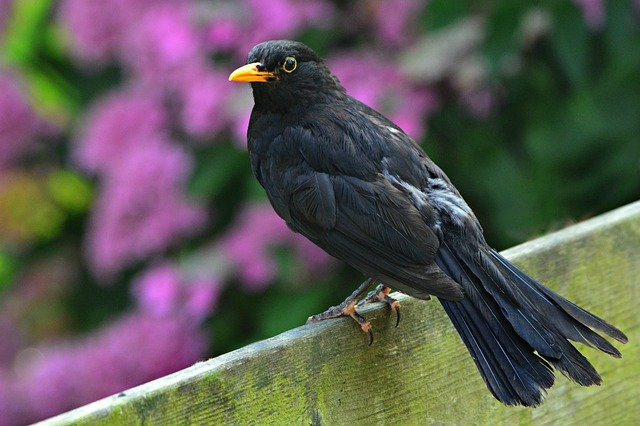
If they aren’t in a garden, they make their homes in wooded areas. But, the iconic song of the male blackbird leads many people to attract these birds into their garden.
Setting the table for blackbird guests is easy to do, if you know what they like. If you tend your garden well enough, chances are the food these birds are after will prepare itself.
Insects & Other Invertebrates
The blackbird’s favorite entre items are earthworms and grubs.
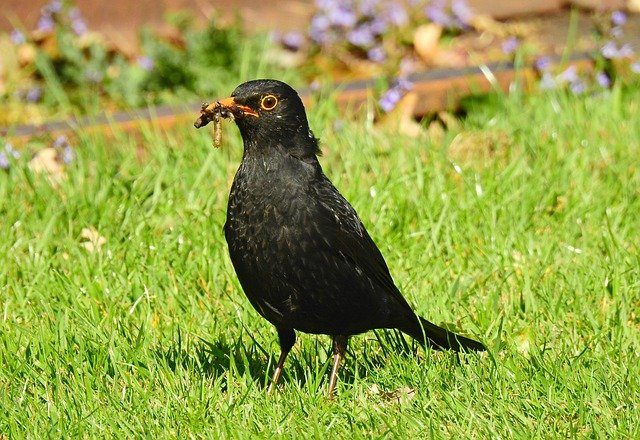
This bird will forage in the moist soil of a well-tended garden and seen tugging a pink worm from the soil. This early bird is well-practised at finding its favored food.
Blackbirds can spot worms protruding from the soil and even hear them below the surface.
Digging them up is not a problem, as many a gardener can attest after having their neat rows rooted through.
In fact, sometimes it can seem like blackbirds are hell bent on mischief. They overturn soil, scatter leaf piles in search of grubs, slugs, and snails that live in dark, moist places.
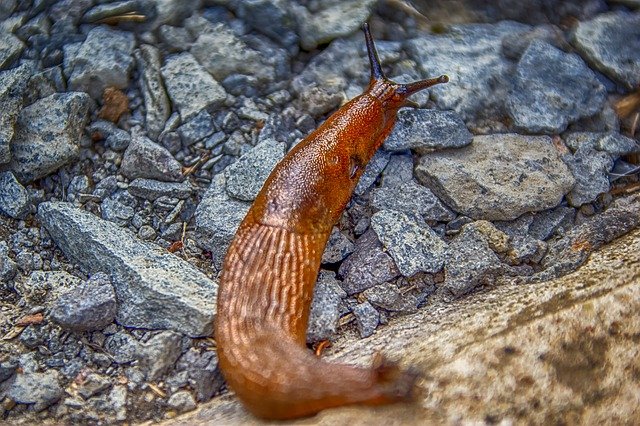
Not every invertebrate requires such wholesale destruction to get to. Insects, arachnids and molluscs together make this bird’s diverse diet.
What Insects and Invertebrates do Blackbird Eat?
Blackbirds love to indulge on insects and invertebrates but here are their favourites…
- Earthworms
- Grubs
- Slugs
- Snails
- Mealworms
- Waxworms
- Caterpillars
- Spiders
- Beetles
- Crickets
Nutrition
This bird relies on protein and fat in its spring and summer diet, making invertebrates ideal.
Worms, grubs, and caterpillars in particular are about 70% protein and 11% fat – a blackbird bonanza.
Earthworms also provide higher essential amino acids than in meat or fish, like:
- Lysine: This compound helps the bird absorb calcium, crucial for bone and beak strength. It also improves collagen formation, leading to healthier skin, cartilage, tendons, and feathers.
- Methionine: This amino acid increases the amount of acid expelled in waste, and helps improve liver function. It also bolsters wound healing, which is useful for this combative, territorial bird.
However, it’s not just the squirmier invertebrates that are nourishing to blackbirds. Taken as a whole, this category provides the full range of vitamins and minerals these birds require.
List of Vitamins & Minerals from Insects & Invertebrates:
- Vitamins, A, B-6, B-12, C, D, E & K
- Calcium
- Copper
- Iron
- Manganese
- Magnesium
- Phosphorus
- Potassium
- Selenium
- Zinc
Fruits & Berries
When the year turns cold, foraging for insects becomes more difficult. Blackbirds are aware, as its diet alters in autumn, from invertebrates to plant matter.
Berries are their preference. As a ground-feeding bird, they prefer berries from a bush rather than high-hanging fruits.
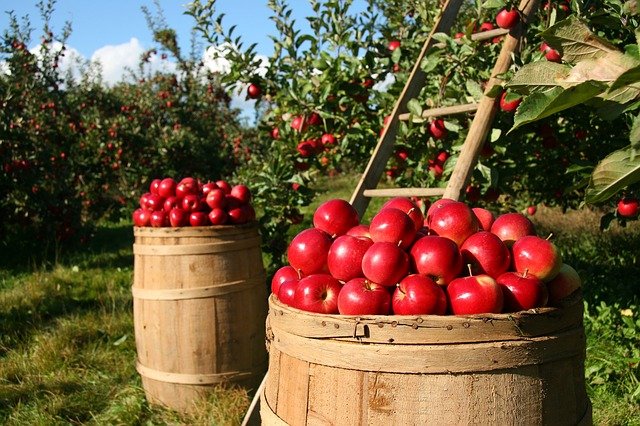
However, these feathered foragers will gorge themselves on fallen apples, pears, and the like. The fruit and berries in a given blackbird’s diet will be dictated by what is available.
This can mean windfall apples and blackberries, but if you were to leave mangos out on a bird table, they would be eaten just as quickly.
Because of this, a list of fruits and berries that blackbirds are known to eat would rightly contain almost all of them.
What Fruit and Berries do Blackbirds Eat?
Blackbirds have many types of fruits and berries in their diet. Here are a few that they prefer to eat.
- Apples
- Pears
- Strawberries
- Cherries
- Grapes
- Raisins
- Currants
- Sultanas
- Plums
- Elderberries
- Blueberries
- Blackberries
- Mulberries
Nutrition
Many of the berries that blackbirds consume are often considered “superfoods.” They have exceptionally high concentrations of vitamins and minerals, as well as powerful antioxidants like flavonoids.
Darker berries in particular contain anthocyanins, antioxidants that lower blood pressure and sharpen vision — perfect for spotting meals amidst piles of leaves and debris.
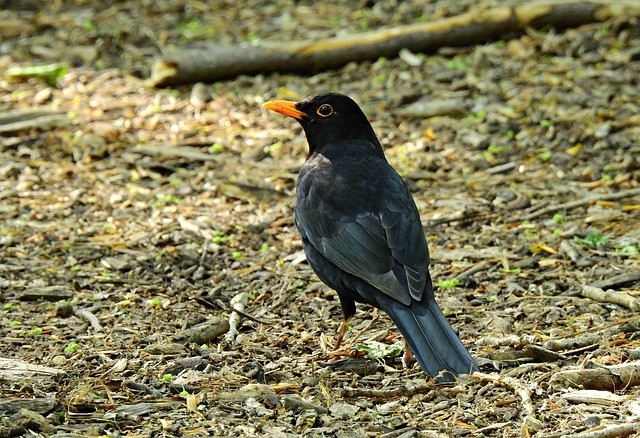
In general, these compounds reduce inflammation, and can have antibacterial properties as well.
It’s the fructose content of fruit that serves as the biggest draw for blackbirds, however.
That sugar provides them with the energy they need to endure the cold months, and to keep hunting tirelessly for sources of the ever vital protein and fat that fruits and berries don’t provide.
It’s fair to say that these sweet plant parts are part of a blackbird’s balanced diet, however, and they offer much to make up for what they don’t have.
List of Vitamins & Minerals from Fruit & Berries:
- Vitamins A, B-6, B-9, C, & K
- Calcium
- Potassium
- Fiber
- Iron
- Magnesium
- Manganese
Seeds & Grains
Blackbirds are softbills. Their beaks are perfectly fine for spearing worms and berries, but when it comes to something like a hard kernel of maize or a seed in a thick shell, these birds will pass.
Yet, there are a few seeds and grains that the blackbird enjoys, and even those they would normally forgo can be made palatable to them. For example, they love flaked maize, and they can easily eat it cooked.
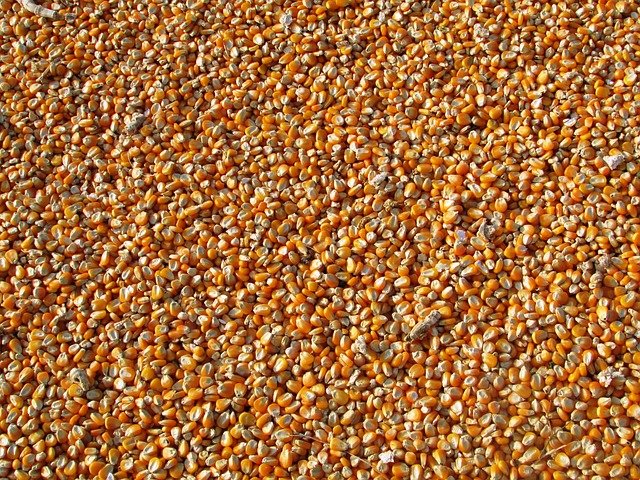
Rolled oats, cut wheat, shelled sunflower seeds — all of these are more convenient for blackbirds to consume.
It is common to find blackbirds foraging grain fields in winter, picking through the chaff in search of insects, but not passing up on the grains they find.
They are more enthusiastic when it comes to eating seed mixes from feeders and trays, as they can easily get their fill.
What Seeds and Grains do Blackbirds Eat?
Seeds and grains ae an important part of the blackbird’s diet, here are a few of their favourites…
- Flaked Maize
- Flaked Wheat
- Hulled Oats
- Sunflower Hearts
- Kibbled Peanuts
Nutrition
A blackbird’s preferred seeds and grains contain, as you may have noticed, a good percentage of fat. Peanuts and sunflower seeds average about 50% fat content by weight.
The other grains listed have much less, ranging between 2-5%. However, their carb content provides ready energy for a blackbird, along with protein and other nutrients.
List of Vitamins & Minerals from Seeds & Grains:
- Vitamins A, B-6, B-7, B-12, & C
- Calcium
- Iron
- Folate
- Magnesium
- Manganese
- Potassium
Processed Foods
Omnivorous birds such as the blackbird are not limited to whole foods they find in the wild.
Cooked, preserved, and otherwise processed foods can and do make up a portion of many a blackbird’s diet, though only in pet birds is it the dominant source of nourishment.
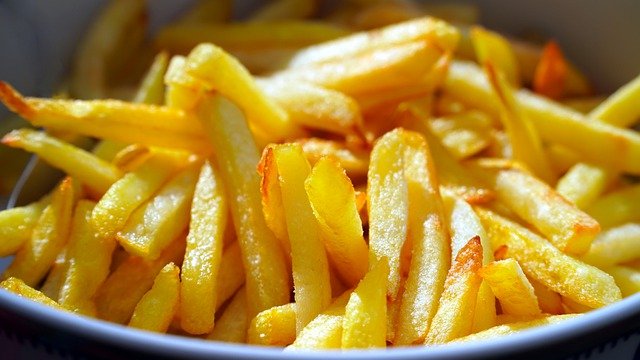
This bird has a penchant for fatty foods like fried breads, chips, and pastries. Such foods aren’t exactly healthy and long term could lead to nutrient deficiencies. And, not all processed foods are so lacking in nutrition.
Dog food, which blackbirds seem to love, tends to be quite healthy for them. It is formulated to provide a dog everything it needs to thrive, much of which is equally vital to blackbirds.
Whether the food is healthy or not, blackbirds are able to power through lean times by virtue of their ability to eat much of what we eat.
What Human Foods do Blackbirds Eat?
Attracted by human leftovers, blackbirds love many of our food throwouts, here are their favourites.
- Bread
- Pastries
- Chips, or French Fries
- Pasta
- Crackers
- Dog Food
- Popcorn
- Suet
- Processed Meats
- Applesauce
- Nut Butters
Nutrition
Processed foods as a category contain all the vitamins and minerals that aren’t destroyed by a particular processing method.
For instance, when wheat is milled into flour, it quickly loses most of its nutrients to oxidation, which is why breads are mostly “empty” carbs.
Peanut butter retains much of the peanuts nutrient profile, though many brands add sugar as well. Luckily, processed foods come with ingredients lists, so you can know exactly what they contain.
If you intend to feed such foods to starlings, aim for items with a high proportion of protein, followed by fat, and that are significant sources of some vitamins and minerals.
What do Baby Blackbird’s Eat?
Blackbird parents rear their children in the spring/summer months. During that time, their diet consists largely of invertebrates, and that carries over to their chicks, which are fed the same.
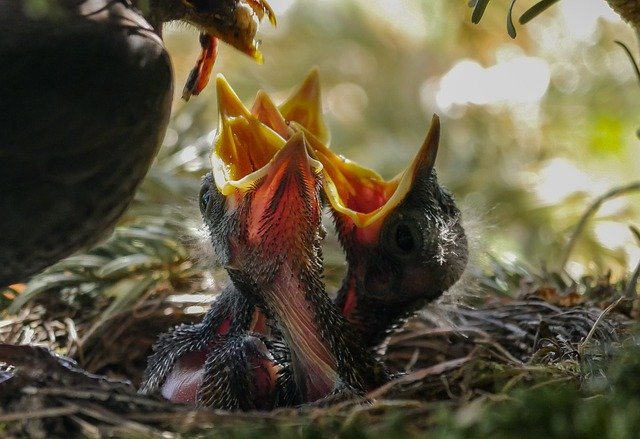
The location of the nest can play a part in a baby blackbird’s diet. If the parents built their home in a garden, then earthworms are the food of choice, out in the woods, this changes to caterpillars.
For humans hand-feeding the little ones, moistened puppy kibble is often used. Though live mealworms, earthworms, and grubs are just as effective being fed by hand as by beak.
Conclusion
With such a wide range of things they can eat, blackbirds are happy to stick to the foods they prefer. Because of this, it’s not difficult to tweak your feed to attract or discourage their presence.
They can be quite messy eaters, kicking among your leaves and digging up your dirt.
But, you may find it worth it in exchange for a chance to hear one of the prettiest songs in the animal kingdom, from a front row seat in your own backyard.
F.A.Q.s — Popular Blackbird Diet Searches
What Foods Do Blackbirds Not Like?
Blackbirds dislike food that is too large for them to safely swallow, or too hard for them to break apart. This means most nuts and seeds still in their shells.
For instance, the shell of a safflower seed striped sunflower seed is too hard for them to crack.
Likewise, they can’t handle whole peanuts or corn kernels. Interestingly, they also don’t like thistle, even though they can easily eat it.
Do Blackbirds Eat Bananas?
Yes, they do like to eat a banana. They don’t encounter them naturally in the wild, but when given a chance to try them, they have enthusiastically filled their beaks with that soft, white flesh.
The high sugar content, paired with that buttery consistency, makes this exotic fruit a good match for the blackbirds.
They can easily peck into it, and it rewards them with instant energy, along with potassium, magnesium, and vitamins A, B-6, and C.
Do Blackbirds Use Bird Feeders?
Yes, but it depends on how the feeder is designed. The blackbird is a ground feeding bird. It’s used to having a solid place to stand comfortably while eating.
Feeders that feature platforms that allow this behavior can and will be used by blackbirds.
Hanging feeders with no such perch are not suitable for this bird. They will not cling to mesh to feed, and they can’t hover in place while grabbing a mouthful, either.
What Do Blackbirds Eat In New Zealand?
The overall diet composition is the same as elsewhere — primarily invertebrates, with a greater emphasis on fruits and berries later in the year.
However, the prevalence of certain plants means the specifics of the blackbird’s diet in this country are unique.
New Zealand has many trees known as podocarps. These conifers are noteworthy for their berry-like cones, which blackbirds love.
In NZ Blackbirds Like to Eat:
- miro
- rimu
- kahikatea
- matai trees.
Can Blackbirds Eat Cat Food?
They can, but you have to pay careful attention to the ingredients.
Cat food in general has significantly higher amounts of everything from protein and fat to certain vitamins and minerals, when compared to dog food.
This may sound good, but birds are much smaller creatures, with different mineral tolerances. For example, cat food based on fatty fish may have very high concentrations of vitamin D.
Excessive amounts of this vitamin causes bones to lose calcium. This is especially detrimental to birds, considering their delicate bone structure, and can also weaken their beaks.